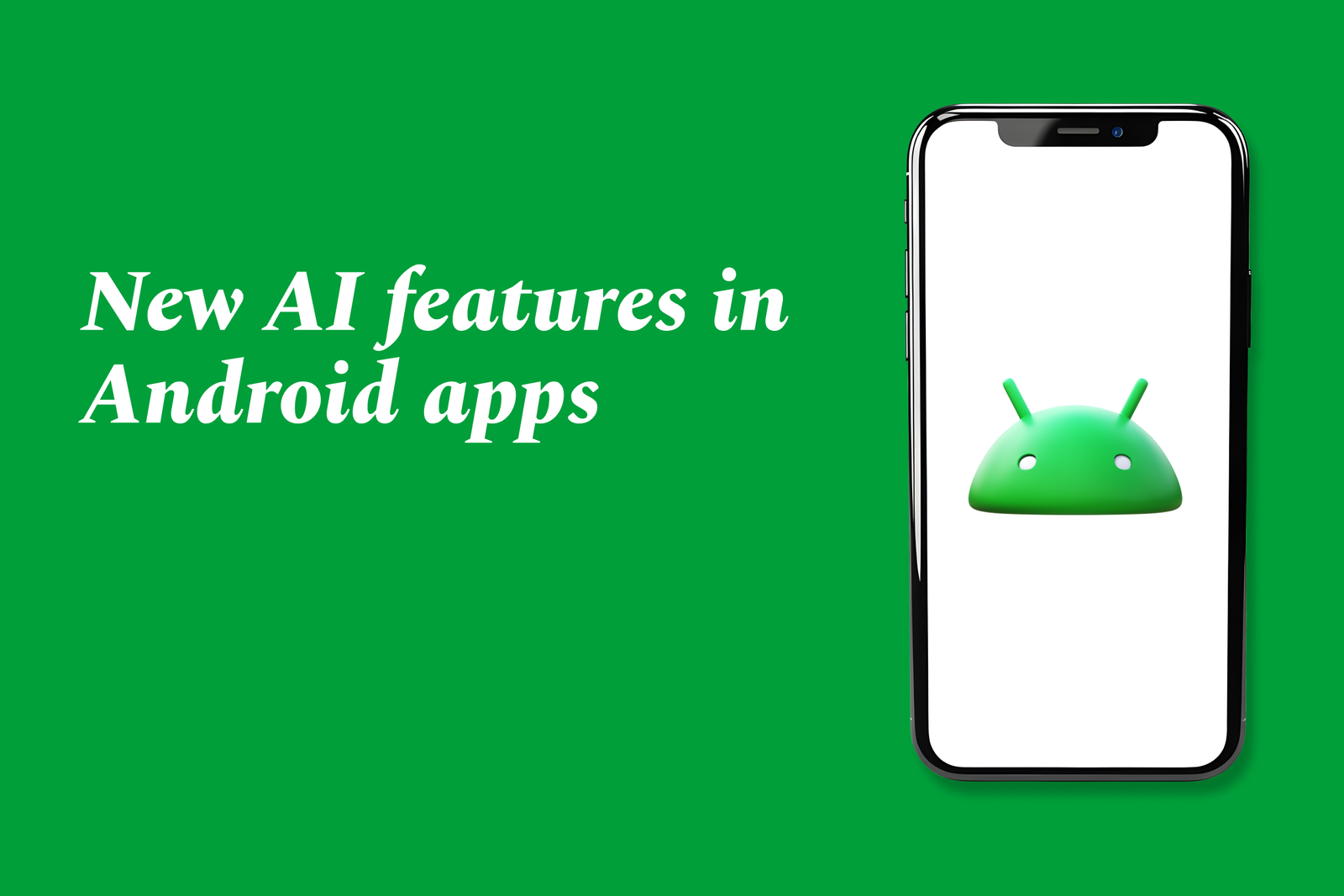New AI Features in Android Apps
New AI features in Android apps, powered by Gemini APIs and tools like Magic Editor and Duet AI, enable enhanced creativity, automation, and personalized experiences. These innovations streamline tasks and enrich user interaction across diverse devices and app categories.
New AI features in Android apps
1 ) Integration of Gemini APIs for AI Powered Android Apps
Developers can now build advanced AI experiences in Android apps using the new Gemini APIs.
These tools enable app creators to integrate powerful generative AI capabilities directly, enhancing functionality and user interaction.
2 ) AI Tools for Everyday Tasks
Android apps are being enhanced with AI features that simplify daily activities.
Examples include assistance with event decoration ideas or recipe adjustments, making the user experience more intuitive and helpful.
3 ) Magic Editor and Gen AI Wallpapers
New creative AI tools such as Magic Editor transform photos from ordinary to extraordinary with effortless editing.
Gen AI Wallpapers allow users to generate imaginative, personalized wallpapers using AI, adding a personalized touch to devices.
4 ) Duet AI Automation
Duet AI enables automation within Android apps by interpreting natural language keywords.
This feature helps automate tasks seamlessly, improving productivity and efficiency in app usage.
5 ) Comprehensive Developer Resources
Google provides extensive training courses, tutorials, and tools for developers to create AI powered apps effectively.
Resources include Kotlin for Android, Compose for teams, and monetization strategies with Google Play.
6 ) Across Device AI Experiences
AI driven apps are designed to provide consistent, seamless experiences across multiple devices including phones, tablets, Wear OS watches, Android Auto, Android TV, and ChromeOS.
This ensures users enjoy AI enhancements regardless of the device they use.
7 ) Category Specific AI Development Guidance
Google offers structured guidance for building apps tailored to specific categories such as games, camera & media, social & messaging, and health & fitness.
This prescriptive support helps developers leverage AI appropriately for their app’s use case.
Summary:
Android apps are leveraging new AI features powered by Gemini APIs and other Google AI tools to revolutionize user interaction. From creative tools like Magic Editor and personalized wallpapers to automation with Duet AI, the platform is significantly enhancing app capabilities. Developers are supported with robust resources and device integration guidance to build innovative AI experiences that span diverse Android devices and app categories.
https://justacademy.in/news-detail/google-i/o-2025-highlights:-flutter-takes-the-lead
https://justacademy.in/news-detail/flutter-+-gemini-ai-integration-tutorial
https://justacademy.in/news-detail/future-of-flutter-careers-post-2025
https://justacademy.in/news-detail/android-15-beta-released:-key-features-to-know
https://justacademy.in/news-detail/performance-testing-in-flutter-4.0
Related Posts
Java supports GDPR and data privacy by enabling secure data handling through encryption, controlled access, and precise data management. It allows developers to minimize PII exposure, ensure data confidentiality, and design workflows that comply with data protection regulations effectively.
Java code quality tools have evolved to include advanced static analysis, integrated security checks, and AI-powered code reviews. These updates help developers detect bugs, enforce coding standards, and enhance security, streamlining the development process and improving overall code reliability.
Java remains a cornerstone in big tech companies, evolving with modern features like records, pattern matching, and virtual threads. Its robust ecosystem, enhanced performance, and growing AI integrations keep it vital for both legacy systems and innovative new projects.
Java and CI/CD pipeline optimizations streamline Java application development by automating builds, tests, and deployments. They improve efficiency through parallelization, caching, and secure secrets management, enabling faster feedback loops and more reliable, scalable software delivery.
Java supports modern cryptography standards through its flexible Java Cryptography Architecture (JCA), enabling integration of advanced algorithms like AES, EdDSA, and post-quantum tools. Libraries like Bouncy Castle offer FIPS-certified, hardware-accelerated implementations for secure development.
Java 23 enhances record patterns by enabling concise, direct destructuring of record components within pattern matching, simplifying type checks and data extraction. This improvement boosts code readability and expressiveness by reducing boilerplate in handling immutable data classes.
Java remains a top choice for mobile app backends, powering scalable, secure, and high-performance server-side solutions. Latest trends include cloud-native microservices, reactive programming, and enhanced JVM optimizations, enabling efficient, flexible, and robust mobile backend development.
Java SE 24 and LTS Java SE 21 offer enhanced features and performance, while Apache Spark 4.0.0 introduces Scala 2.13 support and advanced ML and SQL capabilities. Together, they empower developers to build scalable, high-performance data applications with modern tools.
JUnit 5 modernizes Java testing with a modular architecture, improved assertions, and seamless Java 8+ support. Beyond JUnit, tools like Mockito and AssertJ enhance mocking and assertions, creating a powerful, flexible ecosystem for writing clean, efficient Java unit tests.
Java plays a pivotal role in cloud automation tools by providing a robust, platform-independent language used to build scalable automation frameworks like Jenkins and Selenium, enabling efficient CI/CD pipelines, testing, and orchestration across diverse cloud environments.










